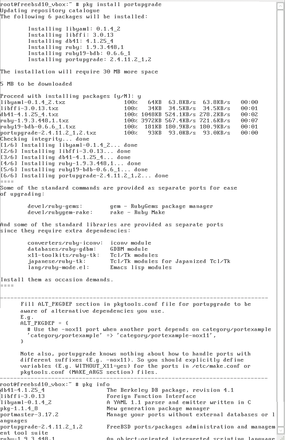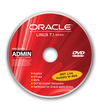« Previous 1 2 3
FreeBSD Version 10 released
News from BSD
Package Management
FreeBSD 10 has also moved to a new, previously optional, package manager [7]. The pkg tool now replaces the tools used previously: pkg_add, pkg_info, and pkg_delete.
The new package manager especially improves the resolution of dependencies that arise when an application needs other programs, libraries, or scripts. The pkg command transfers dependency management to a SQLite database and, thus, improves speed and stability significantly.
In the future, pkg will also process signed packages and thereby add a safety feature. However, pkg does not to manage the ports; this is left to the portmaster and portupgrade tools, which reside in the /usr/ports/ports-mgmt directory. To keep the management of ports and packages consistent, add the following line to your /etc/make.conf file, if it does not already exist:
WITH_PKGNG=yes
Operations are simple and command-line oriented, like before. Figure 6 shows the dependencies using the portupgrade tool.
The new package management software does not just install and uninstall applications, it also takes care of upgrades. Typing
# pkg version
retrieves a list of all packages, whereas the following command updates all outdated software, including all dependencies:
# pkg upgrade
The pkg tool also takes care of security. The command
# pkg audit -F
displays all packages with security vulnerabilities.
Installation
Even in the new version, FreeBSD installation is still via the text interface of the bsdinstaller tool. Text-based installation prevents potential problems with Xorg detecting the graphics hardware. The new version of bsdinstaller lets you install the system in a ZFS pool (Figure 7), which previously involved some effort [8].
 Figure 7: The installer now lets you install FreeBSD in ZFS pools, although this is still experimental.
Figure 7: The installer now lets you install FreeBSD in ZFS pools, although this is still experimental.
The FreeBSD default installation generally runs smoothly, both on laptops and on servers. However, the weak points still remain: support for ACPI and graphics hardware. On a laptop, you will definitely want to remove the vesa module from the kernel; otherwise, the notebook will crash the next time it resumes.
Furthermore, the experimental installation of FreeBSD in a ZFS pool caused some trouble. A virtual machine created with VirtualBox regularly crashed or became unresponsive with this configuration in our tests.
Generally, the new version, FreeBSD 10, is still a stable and secure operating system, and it adds some useful new features. Apart from resolving the problems mentioned above, I would like to see wider hardware support, for example, in the WiFi department. That said, FreeBSD 10 is recommended because of its great quality for supported hardware.
Infos
- FreeBSD: http://www.freebsd.org/
- LLVM: http://www.llvm.org
- Clang: http://clang.llvm.org/
- Tickless kernel on FreeBSD: https://wiki.freebsd.org/SOC2009PrashantVaibhav
- Working with the graphical environment on FreeBSD: https://wiki.freebsd.org/Graphics
- BSD Hypervisor: http://www.bhyve.org
- Package management tool: http://www.unixmen.com/add-package-management-tool-freebsd-10/
- Root on ZFS: https://wiki.freebsd.org/RootOnZFS
« Previous 1 2 3
Buy ADMIN Magazine
Subscribe to our ADMIN Newsletters
Subscribe to our Linux Newsletters
Find Linux and Open Source Jobs
Most Popular
Support Our Work
ADMIN content is made possible with support from readers like you. Please consider contributing when you've found an article to be beneficial.







